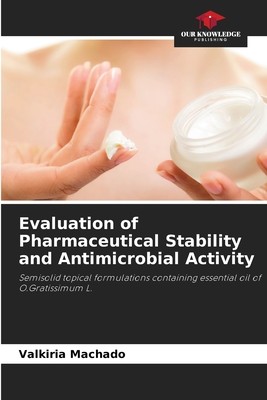
- We will send in 10–14 business days.
- Author: Valkiria Machado
- Publisher: Our Knowledge Publishing
- ISBN-10: 620785456X
- ISBN-13: 9786207854561
- Format: 15.2 x 22.9 x 0.3 cm, softcover
- Language: English
- SAVE -10% with code: EXTRA
Evaluation of Pharmaceutical Stability and Antimicrobial Activity (e-book) (used book) | bookbook.eu
Reviews
Description
Currently, microorganisms resistant to multiple antimicrobials represent a major challenge in the treatment of infections. An important strategy for reducing microbial resistance is the discovery of new substances with antibacterial and antifungal properties, mainly from natural sources. Ocimum gratissimum, popularly known as alfavaca and manjericão, is used in Brazil as a local antiseptic against fungi and bacteria. Due to this activity, it is one of the species considered for inclusion in the phytotherapy programme of the Unified Health System (SUS). As O. gratissimum causes toxicity when administered orally, the alternative to its use is in topical preparations. This research has shown that it is possible to incorporate the plant's oil into formulations and that they have satisfactory physicochemical characteristics and stability, representing technological feasibility for the pharmaceutical area.
EXTRA 10 % discount with code: EXTRA
The promotion ends in 18d.15:26:48
The discount code is valid when purchasing from 10 €. Discounts do not stack.
- Author: Valkiria Machado
- Publisher: Our Knowledge Publishing
- ISBN-10: 620785456X
- ISBN-13: 9786207854561
- Format: 15.2 x 22.9 x 0.3 cm, softcover
- Language: English English
Currently, microorganisms resistant to multiple antimicrobials represent a major challenge in the treatment of infections. An important strategy for reducing microbial resistance is the discovery of new substances with antibacterial and antifungal properties, mainly from natural sources. Ocimum gratissimum, popularly known as alfavaca and manjericão, is used in Brazil as a local antiseptic against fungi and bacteria. Due to this activity, it is one of the species considered for inclusion in the phytotherapy programme of the Unified Health System (SUS). As O. gratissimum causes toxicity when administered orally, the alternative to its use is in topical preparations. This research has shown that it is possible to incorporate the plant's oil into formulations and that they have satisfactory physicochemical characteristics and stability, representing technological feasibility for the pharmaceutical area.


Reviews